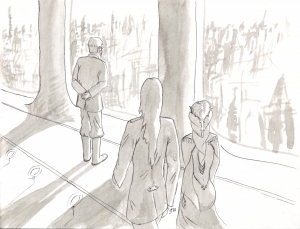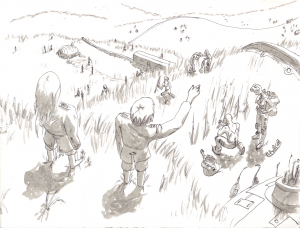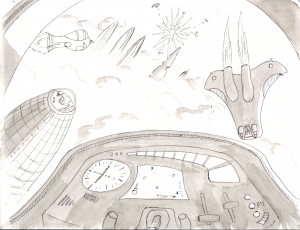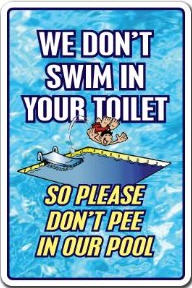Rather than Links Of The Week, which was becoming hard to keep up with, I am going to try monthly links posts with the best web links I discover each month. It’s easier for me and you, because all the links will be in the same place. So here are some reads I found particularly useful this past month.
Politics:
This is awesome: a guy telling the truth about the debt situation and how we’re being screwed by politicans. http://youtu.be/gIcqb9hHQ3E
For Writers:
The Dark Side Of Publishing, an important warning for writers: http://www.editorialdepartment.com/resources/archives/publishing-perspectives/177-the-dark-side-of-publishing.html
Up and coming author Ken McConnell tracks his ebook sales–with interesting implications for average, unknown SF writers: http://ken-mcconnell.com/2011/04/02/a-year-of-selling-indie-sci-fi
The links in this Writer’s Digest article are invaluable tools for developing short story craft: http://www.writersdigest.com/online-editor/how-to-take-your-short-stories-to-the-next-level
Authors RA Salvatore and Paul S. Kemp weigh in on writing action scenes: (Salvatore) http://www.omnivoracious.com/2011/08/ra-salvatore-on-how-to-write-a-damn-good-fight-scene.html (Kemp) http://paulskemp.com/blog/the-purpose-of-fight-scenes/
10 Ways Blogs Lose Audience and Alienate Readers, a warning: http://www.writersdigest.com/whats-new/10-ways-writers-lose-blog-traffic-and-alienate-readers?et_mid=514987&rid=2992253
That controversial NPR popularity contest for Best Science Fiction and Fantasy Novels: http://www.npr.org/2011/08/09/139248590/top-100-science-fiction-fantasy-books
Saladin Ahmed at Fantasy Magazine talking about Islamic Myths, Monsters and Morals: http://www.fantasy-magazine.com/new/new-nonfiction/the-messengers-monsters-and-moral-instructors-of-islamic-literature/
12 Essential For A Successful Author Website: https://bryanthomasschmidt.net/2011/08/15/10-essentials-for-a-successful-author-website/
10 Tips For Finding Time To Write: https://bryanthomasschmidt.net/2011/08/01/10-tips-for-finding-time-to-write/
15 Web Resources Invaluable To Writers: https://bryanthomasschmidt.net/2011/07/28/15-web-resources-invaluable-to-writers/
10 Top Tools For Improving Your Blog: https://bryanthomasschmidt.net/2011/08/04/10-top-tools-for-improving-your-blog/
My first author interview with Anthony Cardno: http://anthonycardno.com/?p=224
Library Journal talks about epic fantasy making a comeback. Seems to me fantasy’s outdistanced SF for years but still interesting: http://www.libraryjournal.com/lj/newsletters/newsletterbucketbooksmack/891346-439/epic_journeys_fantasy_makes_a.html.csp
Cat Valente, Author and Editor of Apex Magazine, reflects on reading with some profound thoughts: http://yuki-onna.livejournal.com/651254.html
I09 weights in with 10 Science Fiction Books That Changed History: http://io9.com/5832078/10-science-fiction-books-that-changed-the-course-of-history
A free spreadsheet of Ebook Service Professionals, including file converters, cover designers and more: https://docs.google.com/spreadsheet/ccc?pli=1&key=0At-RSfaoYUZbdE0xNkZza053VEFBei1pZUZncXdmYmc&hl=en_US#gid=0
Shimmerzine with Confession Of A Slush Reader: http://www.shimmerzine.com/201
Science:
Intriguing but a bit silly perhaps. Are scientists really expecting a deep impact/Armageddon-type scenario as this article suggests: http://www.foxnews.com/scitech/2011/08/16/space-mission-aims-to-blast-asteriod-headed-for-earth/?test=faces
A fascination look at “The Uncanny Valley” a robotics concept which has implications for Science Fiction writing from author Jonathan Dalar: http://jonathandalar.blogspot.com/2011/08/crossing-uncanny-valley.html
Does the downsizing of NASA represent a loss of our sense of wonder and exploratory drive? https://bryanthomasschmidt.net/2011/07/24/grandmas-scrapbook/
The Hubble Telescope reveals a Cosmic Necklace larger than a solar system: http://www.cosmosmagazine.com/news/4620/hubble-reveals-cosmic-necklace-larger-a-solar-system
This articles posits NASA Scientists talk of aliens destroying Earth when greenhouse gas emissions threaten universe (turns out one of the researches works for NASA but its not NASA official): http://m.guardian.co.uk/science/2011/aug/18/aliens-destroy-humanity-protect-civilisations?cat=science&type=article+t%3Dm.guardian.co.uk
Here’s MSNBC straightening out the hoopla on the NASA-ET thing above: http://cosmiclog.msnbc.msn.com/_news/2011/08/19/7419399-what-if-et-thinks-were-evil
Humor:
This one sticks with you but speaks for itself. A prime example of what NEVER to do with your website design: http://dokimos.org/ajff/
A humorous video where a girl who never saw Star Wars tries to explain what she knows about it: http://www.youtube.com/watch?v
Good satire about fictional Kittwood Studios, the source of all cat videos on the web: http://www.youtube.com/watch?v
How desperate is the housing situation in Vancouver, BC? Enough that this guy offers to play pet dinosaur for any landlord who gets him housing: http://realestate.aol.com/blog/2011/08/12/unreal-estate-man-offers-to-be-pet-dinosaur-in-exchange-for-hou/?icid=maing-grid7|main5|dl6|sec3_lnk3|86098
Two WGN news anchors develop a routine to use during commercial breaks: http://www.youtube.com/watch?v
The Glorious Life Of An About To Published Author: https://bryanthomasschmidt.net/2011/07/29/the-glorious-life-of-an-about-to-be-published-novelist-video/
Thinking Up Ideas…It’s a Process: https://bryanthomasschmidt.net/2011/08/03/thinking-up-ideas-its-a-process-okay-video/
Jimmy Kimmel’s Chewbacca Sketch with Harrison Ford: https://bryanthomasschmidt.net/2011/07/29/272/










